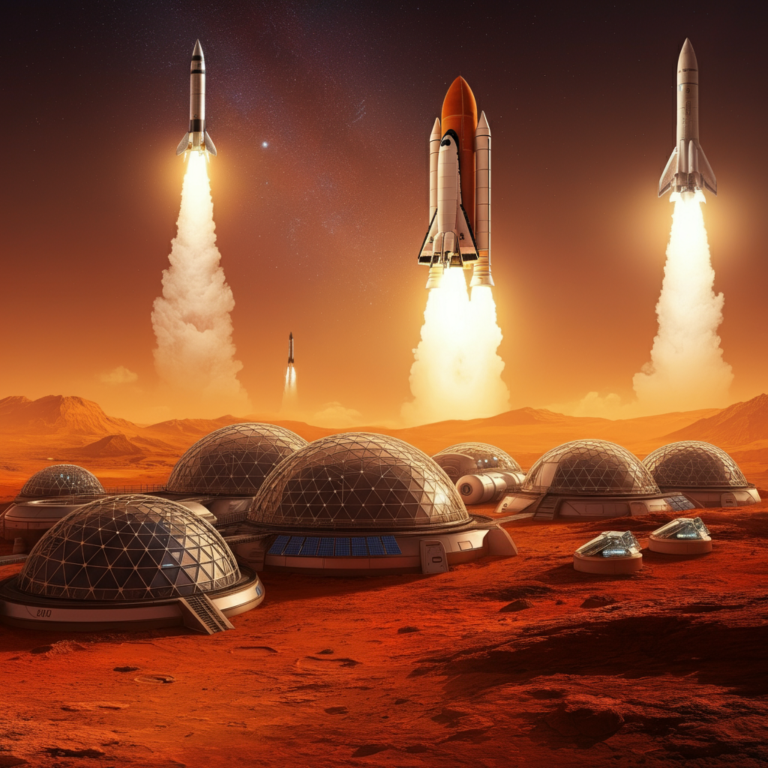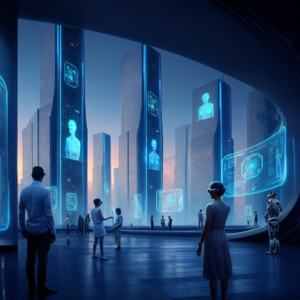Humanity has always been drawn to exploration, pushing the boundaries of what we know and questioning what lies beyond. Today, our sights are set not just at the edges of our planet but beyond Earth, towards the intriguing red planet—Mars. But what if, by 2050, humans successfully colonized Mars? This bold vision represents more than just a leap in space exploration; it could redefine our species, provide solutions to environmental challenges, and shape the future of life itself.
This blog explores the possibilities and implications of humans colonizing Mars by 2050. From the groundbreaking Mars colonization plans of today to the challenges, environmental impacts, and societal shifts that may arise, we’ll shed light on how this dream could become reality—and what it means for humanity.
The Mars Colonization Plan
Colonizing Mars is no longer just science fiction. Organizations such as SpaceX, NASA, and global coalitions are developing ambitious plans that may see humans setting foot on Mars within the next few decades.
Key Plans and Timelines
- SpaceX’s Vision
Elon Musk’s SpaceX is at the forefront of Mars colonization efforts. Musk envisions sending cargo missions to Mars as early as the late 2020s, with the goal of establishing a self-sustaining human settlement by around 2050. SpaceX’s Starship, a fully reusable spacecraft, is being developed to carry passengers and cargo to Mars at a relatively low cost, laying the groundwork for large-scale settlement.
- NASA’s Mars Aspirations
NASA’s Artemis Program is driving advancements in human exploration beyond the Moon. While the Mars mission is expected to follow lunar exploration in the 2030s, NASA’s gradual and meticulous approach includes deploying advanced rovers, satellites, and habitats to ensure safety and sustainability for human missions.
Challenges to Overcome
- Technology Requirements
Developing spacecraft capable of interplanetary travel, creating life-support systems that function without Earth-based resources, and producing structures that enable humans to live on Mars’ harsh terrain are enormous technical challenges.
- Funding
Mars colonization is a massive financial undertaking. Governments, private companies, and international collaborations will need to align resources to sustain this vision for the long term.
- Environmental Concerns
Mars’ thin atmosphere, radiation exposure, and freezing temperatures pose risks to human life, rendering the development of protective infrastructures non-negotiable.
While the obstacles are significant, technological breakthroughs and private-public partnerships are gradually making Mars colonization feasible by 2050.
Environmental Impact and Sustainability
The prospect of settling a new planet demands a responsible approach to planetary stewardship from the outset. Moving to Mars could provide us with lessons on sustainable living—if done correctly.
Potential Environmental Impacts
Settling on Mars will require the extraction of local resources to construct habitats, grow food, and create energy. Without proper guidelines, this could lead to unintended harm to Mars’ environment, including contamination of its pristine surface and potential natural elements.
Mars does not have an ecosystem to disrupt as Earth does, yet the challenges of creating a livable environment there reveal startling parallels to humanity’s environmental impact here. Learning how to adapt sustainably on Mars may help us reduce our ecological footprint on Earth.
Opportunity for Sustainability
Colonization offers an opportunity to embed sustainability in its DNA from day one. For example:
- Renewable Energy
Solar panels and nuclear energy are anticipated to be primary power sources on Mars, which helps replace reliance on fossil fuels.
- Closed-loop Systems
Water recycling, agricultural waste utilization, and innovative life-support designs could provide sustainable food sources and waste reduction practices that may eventually inform Earth-based systems.
The lessons from Mars could inspire solutions to some of the most pressing environmental challenges we face on Earth today.
Societal and Economic Implications
Mars colonization isn’t just about science—it has profound societal and economic implications that will ripple across industries and borders.
Creation of New Industries
Expanding human life to Mars will spur the development of entirely new industries, including:
- Space transportation and infrastructure development.
- Extraterrestrial agriculture to sustain long-term settlers.
- Advanced robotics and automation for hazardous tasks.
These industries will not only fuel economic growth but could translate into advancements that benefit life on Earth.
Global Unity and Cooperation
The international collaboration required for Mars colonization might foster better relationships among nations, pushing us toward a more unified global society. Working together on a common challenge could transform how we approach conflict resolution and diplomacy.
Cultural Evolution
Human life on Mars will produce unique cultural shifts. Languages, traditions, and philosophies—shaped over centuries within Earth’s ecosystems—may evolve differently under Martian conditions. Over time, Martian society could develop its own identity, distinct yet interconnected with Earth.
The Future of Humanity
At its core, colonizing Mars gives humanity a second home—it’s a backup planet for survival in the face of potential Earth-based disasters, such as climate change or asteroid impact.
Evolution of the Human Species
Living on Mars will challenge human biology and culture in ways we’ve never encountered before. The planet’s gravity is only 38% of Earth’s, which might lead to changes in bone density and muscle strength over generations. Additionally, isolation in the Martian environment could shape psychological and societal changes in unforeseen ways.
Expanding Horizons
More philosophically, Mars colonization represents the ultimate expansion of humankind’s horizons. The ability to look up at the night sky, not just toward the stars but toward another home, could fundamentally shift how we see ourselves—both as individuals and as a collective species.
Mars could transform humanity into a truly interplanetary species, with a shared vision of survival, innovation, and exploration.
What Can You Do to Join the Conversation?
Mars colonization isn’t just a topic for scientists, engineers, and astronauts—it’s something everyone should care about. It forces us to think critically about the type of future we want for humanity, both on Earth and beyond.
- Engage with space-related organizations and stay informed about developments in Mars exploration.
- Support sustainable practices on Earth, as they will undoubtedly inform how we approach planetary stewardship.
- Discuss and share thoughts about space exploration’s societal, ethical, and environmental implications—your voice matters in shaping the conversation.
By 2050, Mars might not just be a distant, red dot in the night sky. It could be our second home, a beacon of hope for humanity. The question is—how can each of us contribute to getting there?







